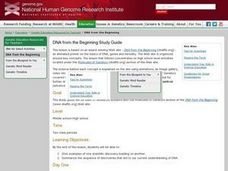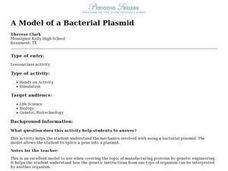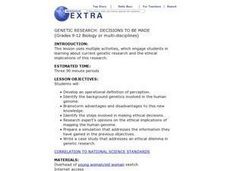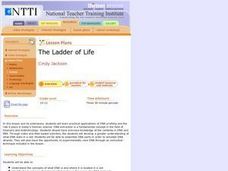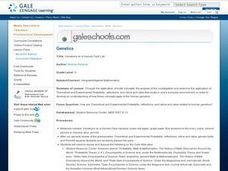Curated OER
One Giant Leap
Students brainstorm important scientific advancements of the twentieth century. They examine the implications of the completion of the first rough draft of the human genome on society. They research a selected scientific advancement of...
Curated OER
DNA-B-C's
Students review what they already know about DNA. After reading an article, they discover a new technique to map the course of evolution. In groups, they create ways to present this material to younger children and research DNA's uses.
Curated OER
The ABC's of DNA
Students describe genetics as if they were explaining it to a young child. After reading an article, they discover new discoveries in the human genome project. Using the internet, they research a pair of genetic terms and develop a...
Curated OER
Translating Genetic Information
Learners explore the process of translation. They determine the correct sequencing and present their strands to the class. In addition, they compare normal red blood cells to sickle cells and complete discussion questions.
Curated OER
TE Lesson: What's Dominant?
Students study the number of chromosomes in the body cells, sperm cells, and egg cells of humans. They define allele, and examine the difference between dominant and recessive alleles. They complete an activity with jelly beans that...
Curated OER
Genetic Mind Reader Review Game
Students review some important concepts and terms relevant to the Human Genome Project and genetic research. The game is played like a mind reading session between two teams.
Curated OER
DNA from the Beginning Study Guide
Students complete a study guide using a website which is an animated primer on DNA, genes, and heredity. The Web site is organized around key concepts. The web links and study guide are included.
Curated OER
Enhancing Students' Problem-Solving Abilities
High schoolers analyze the results of a hypothetical cloning experiment using a restriction endonuclease map obtained from an on-line data source. They answer the question, "How can I tell if the DNA I have obtained from this...
Curated OER
A Model of a Bacterial Plasmid
Students construct a plsmid model with the materials provided and be able to use it to define certain terms and explain other practical applications of genetic engineering. This simulation allows the students to work through the diagram...
Curated OER
Hardy-Weinberg Equilibrium
Students investigate how Hardy-Weinberg Equilibrium is established and what assumptions and conditions are necessary to reach Equilibrium. They model alleles using materials such as index cards, M & M's and goldfish.
Curated OER
Are You Susceptible?
Students play a game to explore the relationship between genetic variation and environmental factors in the onset of heart disease. They consider the implications for disease prevention of increased knowledge about genetic variation.
Curated OER
Infectious Disease Case Study
Students list the steps an epidemiologist takes to detect a pathogen. They role-play as scientists as they investigate the cause of the outbreak in Japan during 1996.
Curated OER
Identifying Disease Genes using BLAST
Students navigate the National Center for Biological Information (NCBI) website and BLAST program to conduct a variety of biological assignments.
Curated OER
How Can You Predict the Characteristics of an Unborn Baby?
Learners compare three sets of unlabeled human chromosomes and gather related data, trace chromosomes to pair them, and make observations about them.
Curated OER
Genetic Research: Decisions to be Made
Students examine the genetics involved in the human genome. They brainstorm the advantages and disadvantages to this discovery. They research different experts opinion and write a case study which addresses an ethical dilemma.
Curated OER
How Does Evolution Work?
Students investigate how natural selection influences evolution. They complete a hands-on lab simulation of natural selection, and replicate a real experiment and examine the interplay between selection factors in a population of guppies.
Curated OER
Genetically-Modified Food
Students investigate the pros and cons of genetic engineering. They watch a short Bill Moyers video, conduct Internet research, create a poster, participate in a pro/con debate, and write an essay expressing their personal feelings on...
Curated OER
The Ladder of Life
Students explain the concepts of what DNA is and where it is located in a cell, identify the two types of molecules that make up the rungs of a DNA molecule and identify the two types of Purine and Pyrimidine molecules
Curated OER
Reaching Into Your Genes
Young scholars interact with a video to explore the basis for the science of chromosomes. They perform a chromosomal analysis called a karyotype and explore how seemingly minute errors in chromosomes can lead to devastating illnesses.
Curated OER
Designing Babies
Students analyze current and emerging techniques used to select specific characteristics in offspring. They examine specific case studies and make ethical decisions based upon the Ethical Decision-Making Model.
Curated OER
Mental Illness: Could It Happen to Me?
Students investigate the effects of depression and the brain's influence on metal illness. The factors that may affect a person's ability to develop depression are examined in this lesson.
Curated OER
Taster or Non-Taster?
Students conduct a simple experiment to determine if a trait has been passed from a family member to them.
Curated OER
Lamarck And Darwin
Students compare Lamarck's mechanism for evolution with Darwin's theory of natural selection.
Curated OER
Variations on a Human Face Lab
Ninth graders gain an application level understanding of probability, symmetry, and ratios and rates that exists in one's everyday environment relative to human genetics.








